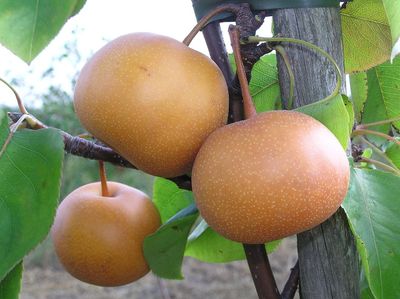What is a Chojuro Asian Pear Tree?
Originating from Japan in late 1895, Chojuro Asian pear trees (Pyrus pyrifolia ‘Chojuro’) are a popular cultivar with russetted orange-brown skin and crisp, juicy white flesh at about 3 inches (8 cm.) or more. The fruit is known for its lengthy storage life too, about 5 months refrigerated. The tree has large, waxy, dark green foliage that turns a gorgeous red/orange in the fall. At maturity the tree will reach 10-12 feet (3-4 m.) in height. Chojuro blooms in early April and fruit ripens in late August to early September. The tree will begin bearing 1-2 years after planting.
How to Grow Chojuro Asian Pears
Chojuro pears can be grown in USDA zones 5-8. It is hardy to –25 F. (-32 C.). Chojuo Asian pears need another pollinator for cross pollination to occur; plant either two Asian pear varieties or one Asian pear and an early European pear such as Ubileen or Rescue. Select a site that is in full sun, with loamy, well-draining soil and a pH level of 6.0-7.0 when growing Chojuro fruit. Plant the tree so that the rootstock is 2 inches (5 cm.) above the soil line.
Chojuro Pear Tree Care
Provide the pear tree with 1-2 inches (2.5 to 5 cm.) of water per week depending upon weather conditions. Prune the pear tree annually. To get the tree to produce the largest pears, you can thin the tree. Fertilize the pear just after new leaves emerge in the later winter or early spring. Use an organic plant food or nonorganic fertilizer like 10-10-10. Avoid nitrogen rich fertilizers.
